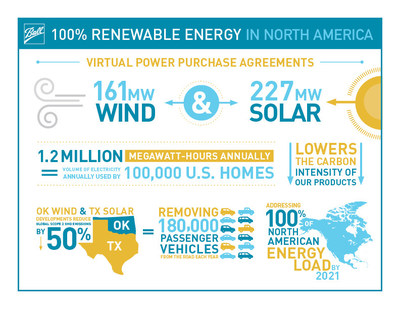Ball Enters Agreements for 100% Renewable Energy in North America by 2021
New agreements support transition to clean energy, commitment to make the aluminum can the most sustainable package
BROOMFIELD, Colo., April 25, 2019 /PRNewswire/ -- Ball Corporation (NYSE: BLL) today announced that it has executed two virtual power purchase agreements (VPPAs) – one wind and one solar – for 388 megawatts (MW) of new renewable energy. These agreements will allow the company to address 100% of the North American electricity load utilized in its corporate, packaging and aerospace operations by the end of 2021.

Together, the wind and solar developments in Oklahoma and Texas will allow Ball to reduce its global Scope 2 greenhouse gas emissions by 50%, equivalent to the carbon reduction of removing 180,000 passenger vehicles from the road annually.
"These renewable energy agreements place Ball among the leading corporate buyers of renewable energy in our industry and the U.S., marking a critical moment in our sustainability journey, and are a demonstration of our commitment to have the aluminum can recognized as the most sustainable package," said John A. Hayes, chairman, president and CEO. "The combined wind and solar projects will allow us to address our North American electricity use, and make significant progress toward our previously announced Scope 1 and 2 science-based GHG emissions target, while leaving room for growth in our businesses."
Ball first began using renewable energy in 2015, building three wind turbines in partnership with a local service provider to help power its Findlay, Ohio, beverage packaging plant. In 2018, Ball expanded the Findlay project to six turbines, which will generate more than 24,000 megawatt hours (MWh) of energy each year.
The long-term VPPAs for the new wind and solar developments significantly expand upon Ball's previous success. With a combined annual estimated energy production of 1,200,000 MWh—equivalent to the volume of electricity used by 100,000 U.S. homes each year—these projects will contribute nearly 5,000% more renewable energy to Ball's North American electricity portfolio.
"Utilizing renewable energy is an important lever to further enhance the sustainability credentials of our packaging and we're exploring similar opportunities across our global footprint," Hayes said. "We also continue to work with our customers, suppliers and other industry partners to further enhance the can's sustainability credentials and meet increasing customer, consumer and retail demand for more sustainable solutions to the plastic pollution crisis."
Ball was advised on the VPPAs by Schneider Electric Energy and Sustainability Services, who assisted the company in its project selection and negotiations.
While other beverage containers may degrade and end up polluting the environment, aluminum packaging can be recycled and back on store shelves in as little as 60 days. In fact, 75% of the aluminum ever produced is still in use today. Innovative, infinitely recyclable and economically valuable, aluminum packaging can help build brands, inspire consumers and convey an investment in the future of our planet.
Ball continues to drive improvements in the areas of circular economy, climate change, water stewardship and responsible sourcing and will release its 2018 sustainability achievements, as well as updated, third-party verified sustainability data, in May. For more information about Ball's ongoing sustainability efforts, please visit www.ball.com/sustainability.
About Ball Corporation
Ball Corporation supplies innovative, sustainable packaging solutions for beverage, personal care and household products customers, as well as aerospace and other technologies and services primarily for the U.S. government. Ball Corporation and its subsidiaries employ 17,500 people worldwide and reported 2018 sales of $11.6 billion. For more information, visit www.ball.com, or connect with us on Facebook or Twitter.
Forward-Looking Statements
This release contains "forward-looking" statements concerning future events and financial performance. Words such as "expects," "anticipates," "estimates," "believes," "targets," "likely," "positions" and similar expressions typically identify forward-looking statements, which are generally any statements other than statements of historical fact. Such statements are based on current expectations or views of the future and are subject to risks and uncertainties, which could cause actual results or events to differ materially from those expressed or implied. You should therefore not place undue reliance upon any forward-looking statements and any such statements should be read in conjunction with, and, qualified in their entirety by, the cautionary statements referenced below. The company undertakes no obligation to publicly update or revise any forward-looking statements, whether as a result of new information, future events or otherwise. Key factors, risks and uncertainties that could cause actual outcomes and results to be different are summarized in filings with the Securities and Exchange Commission, including Exhibit 99 in our Form 10-K, which are available on our website and at www.sec.gov. Additional factors that might affect: a) our packaging segments include product demand fluctuations; availability/cost of raw materials and logistics; competitive packaging, pricing and substitution; changes in climate and weather; footprint adjustments and other manufacturing changes; failure to achieve synergies, productivity improvements or cost reductions; mandatory deposit or other restrictive packaging laws; customer and supplier consolidation, power and supply chain influence; changes in major customer or supplier contracts or a loss of a major customer or supplier; political instability and sanctions; currency controls; changes in foreign exchange or tax rates, including due to the effects of the 2017 U.S. Tax Cuts and Jobs Act; and tariffs, trade actions, or other governmental actions in any country affecting goods produced by us or in our supply chain, including imported raw materials, such as pursuant to section 232 of the U.S. Trade Expansion Act of 1962; b) our aerospace segment include funding, authorization, availability and returns of government and commercial contracts; and delays, extensions and technical uncertainties affecting segment contracts; c) the company as a whole include those listed plus: changes in senior management; regulatory action or issues including tax, environmental, health and workplace safety, including U.S. FDA and other actions or public concerns affecting products filled in our containers, or chemicals or substances used in raw materials or in the manufacturing process; technological developments and innovations; litigation; strikes; labor cost changes; rates of return on assets of the company's defined benefit retirement plans; pension changes; uncertainties surrounding geopolitical events and governmental policies both in the U.S. and in other countries, including the U.S. government elections, budget, sequestration and debt limit; reduced cash flow; interest rates affecting our debt; and successful or unsuccessful joint ventures, acquisitions and divestitures, including with respect to the Rexam PLC acquisition and its integration, or the associated divestiture; the effect of the acquisition or the divestiture on our business relationships, operating results and business generally.

View original content to download multimedia:http://www.prnewswire.com/news-releases/ball-enters-agreements-for-100-renewable-energy-in-north-america-by-2021-300838022.html
SOURCE Ball Corporation
Released April 25, 2019